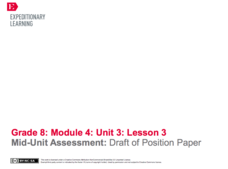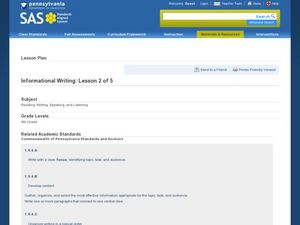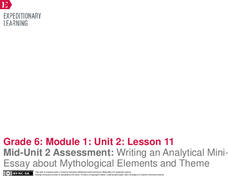Curated OER
How to Write an Essay: Secondary ed.
Whether introducing the structure of expository essays or reviewing the format with your high schoolers, take the time to check out this resource. Examples of seven common forms of introductory paragraphs and six types of conclusions, as...
EngageNY
The Painted Essay for Opinion Writing: Developing a Conclusion and Adding Linking Words
Let's get colorful! Scholars use the Painted Essay technique to analyze and color code the conclusion of a model essay. Working in small groups, pupils then write a conclusion paragraph for their draft editorials about offshore drilling.
Curated OER
The Paragraph
Review the components of a well-written paragraph with your class. Be sure your writers include a topic sentence supported with main ideas and followed by a conclusion. Unity, coherence, and transition words are emphasized. Experiment...
Curated OER
Writing the Essay
Relate the structure of the essay to the structure of a building. The class compares an essay to a building, with the writer being the architect, the introduction being the foundation, and so on. They use the visual representation of a...
Curated OER
Revising Your Draft
Revising, as opposed to editing, is the focus of a presentation that details this essential part of the writing process. The author of this PowerPoint suggests outlining the draft to determine if all the necessary elements are included...
EngageNY
Mid-Unit Assessment: Draft of Position Paper
What is the purpose of an introduction and conclusion? Using the resource, scholars review the model position paper from activity one and discuss the author's choices. Next, they draft their position papers' introductory and concluding...
Southern Nevada Regional Professional Development Program
Common Core Writing Strand: The Research Paper Template for Standards 7-8
Considering a research paper for freshman and sophomores? Here's a template designed to meet the W.9-10.7 and 8 Common Core writing standards. Writers outline their research question, claims, counterarguments, support, commentary, and...
EngageNY
End of Unit Assessment, Part 2: Drafting Introduction and Conclusion of a Narrative
First and last impressions matter. Scholars compose the introductory and concluding sections of their narrative writing assignments. Also, to prepare for an upcoming performance task, pupils watch a modern-day monologue from the movie...
Curated OER
Formal Writing Introduction
Give your class tips on formal writing. A paragraph format is outlined along with specifics for writing a conclusion sentence. A few transitions are listed to vary sentences and sentence structure. Pull this resource back out whenever...
Curated OER
Use Details from Text to Identify Cause and Effect, Draw Conclusions, Compare and Contrast
Third graders discuss research topics and write a paragraph on one of the provided questions. They focus on including key words from charts that the class has been compiling. They underline supporting details within the text they write....
Nancy Fetzer's Literacy Connections
Expository Paragraph
Upper elementary and middle school writers learn how to craft an expository paragraph by following the six steps detailed in a 48-page instructional guide. Learners learn how to write six different types of informational paragraphs: to...
Curated OER
Journeying to Create
Show a video clip that descripes how taking a journey can change a person's outlook on life. Learners write a paragraph about a place that uses imagery and tone to create a specfic effect. They evaluate their journal entries as well.
Curated OER
Writing the Five Paragraph Essay: Some basic rules for writing that you should always follow!
Need a quick review of the format of the five-paragraph essay? The strength of this presentation is in the color-highlighted examples used to illustrate the terms. Consider adding additional slides that provide a model of a complete essay.
Curated OER
The Five-Paragraph Essay: Tips for Success!!
Need to review the five-paragraph format with your high schoolers? Although the presentation does not include a complete essay as a model, the concise definitions and explanations would serve as a good review before learners are assigned...
EngageNY
Speech Writing: Identifying Criteria for a High Quality Conclusion
Learning is never-ending. Scholars learn about effective conclusions as they continue watching a video of an opinion speech. After analyzing the speech's conclusion, they work in small groups to write an ending for their own speeches.
EngageNY
Paragraph Writing, Part II
Come up with a list of requirements for this expository essay on Esperanza's character in Esperanza Rising as a class and use the list to guide class writing. Here, learners will complete the first paragraph, discuss their notes for the...
EngageNY
End of Unit 2 Assessment, Part 1b: Writing Introduction and Conclusion
Writers continue looking at the rubric for their A Long Walk to Water essays. This time, they analyze the demands for the introduction and conclusion paragraphs. Pupils compare the rubric to the opening and closing of the model essay,...
Curated OER
Persuasive Writing II
Help your young writers use logic in their persuasive writing. Discuss the characteristics of a persuasive paper, and have pupils work together to explore and solve a syllogism. They will write a short persuasive paper which includes a...
Pennsylvania Department of Education
Informational Writing: Lesson 2 of 5
Introduce expository writing to your elementary learners. Young authors write a three-paragraph informational paper using the steps of the writing process. They follow guided lessons to experience each of five steps. Included are tons of...
Curated OER
Unlocking the Secrets of a Persuasive Essay
Full of tips about structure, audience, and evidence in a persuasive essay, this presentation would be a great way to start a writing unit in your class. One slide advises young writers to make up quotes and statistics in their essays....
Prestwick House
Writing Arguments in Response to Nonfiction
Emotional appeal or argument? That is the question. An informative lesson helps your class recognize the difference between a logical argument and an emotional appeal and learn how to craft an argumentative response. Writers develop a...
EngageNY
Mid-Unit 2 Assessment: Writing an Analytical MiniEssay about Mythological Elements and Theme
Two is company. Scholars pair up to continue their mini essay writing from the previous lesson. They work on their introduction and conclusion paragraphs and then trade partners for peer feedback and a fresh set of eyes on their work....
School District of Palm Beach County
Framed Paragraphs characterization, problem and solution, symbolism, conflict
Support your learners as they work on writing paragraphs by providing graphic organizers, outlines, and frames. Sift through this packet to find the perfect organizers and templates to prepare pupils for writing. The resource...
Curated OER
Basic Five-Paragraph Essay
Writing can be confusing and difficult at first. Make it easier by showing these slides to your class. Review what should be included in an introduction, thesis, and conclusion. Examples are given along with simple explanations to help...

























